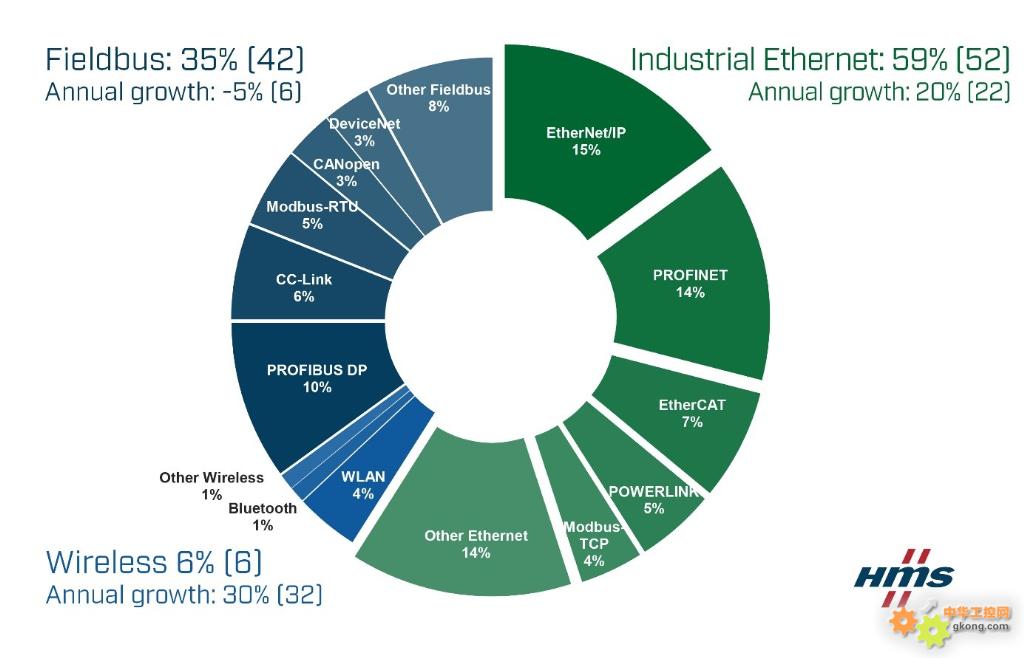HMS发布2019工业网络市场份额报告:工业以太网全球份额占59%
HMS Networks presented their annual analysis of the industrial network market, which focuses on new installed nodes within factory automation globally. As an independent supplier of solutions for industrial communication and the Industrial Internet of Things, HMS has an insight into the industrial network market. Here are some of the trends they see within industrial communication in 2019.
HMS Networks发布了工业网络市场份额年度分析,主要关注的是全球工厂自动化中新安装的节点。作为工业通讯和工业物联网(IIoT)解决方案的独立供应商,HMS对于工业网络市场有着深刻的洞察力。以下是他们在2019年工业通讯领域看到的一些趋势。
More and more industrial equipment is being connected to industrial networks. In 2019, the number of new connected nodes is expected to grow by 10%. Industrial Ethernet and Wireless continue to grow fast, but 2019 also marks the first year of fieldbus decline. These are the main findings in the annual study of the industrial network market by HMS Networks. Industrial Ethernet now accounts for 59% of new installed nodes (52% last year), while fieldbuses are on 35% (42). EtherNet/IP is still the most widely installed network at 15%, but PROFINET is closing in at 14%. Wireless technologies continue to develop strongly and are steady at 6% of the market (6).
越来越多的工业设备正不断连接到工业网络。在2019年,新连接节点数预期可增长10%。工业以太网和无线持续快速增长,而2019年也将首次出现现场总线的下降。这是HMS Networks公司关于工业网络市场年度研究的主要发现。工业以太网现占据新安装节点的59% (去年是52%),而现场总线占据35% (去年是42%)。EtherNet/IP占据15%,依旧是最广泛安装的网络,但PROFINET也非常接近,占14%。无线技术继续强势发展,并且继续稳定占据 6%市场(去年也是6%)。
Continued growth for industrial Ethernet
工业以太网持续稳步增长
Last year, HMS concluded that Industrial Ethernet had surpassed traditional fieldbuses for the first time, and this development continues in 2019. With a steady growth rate of 20% (22), industrial Ethernet now makes up for 59% of the global market (compared to 52% last year). EtherNet/IP is the largest industrial Ethernet network with 15% of the market, but PROFINET has almost closed the gap and is now at 14%. Ethernet runners-up globally are EtherCAT at 7%, Ethernet POWERLINK at 5%, and Modbus-TCP at 4% all of which are showing stable growth.
去年,HMS总结工业以太网首次超越传统现场总线,并且这种演变在2019年得以继续。工业以太网现在以20%(去年22%)的稳步增长率,占据全球市场的59%(去年是52%)。其中,EtherNet/IP是最大的工业以太网网络,占据市场的15%,但PROFINET在不停缩小差距,目前占14%。以太网全球领跑者还有占7%的EtherCAT,占5%的Ethernet POWERLINK,占4%的Modbus-TCP,所有这些都呈稳定增长态势。
Fieldbuses are declining
现场总线正经历下跌
For the first time ever, fieldbuses are declining by -5% (compared to a 6% growth last year), now accounting for 35% of new installed nodes.The dominant fieldbus is still PROFIBUS with 10% of the total world market, followed by CC-Link at 6% and Modbus-RTU at 5%.
有史以来第一次,现场总线下降了5% (去年增长6%),目前占新安装节点的35%。占据主导地位的现场总线依旧是PROFIBUS,占据全球市场的10%,占6%的CC-Link紧随其后,再后面是Modbus-RTU,占5%。
Reflections on the industrial Ethernet growth and the fieldbus decline
工业以太网增长与现场总线下降的思考
“The transition to industrial Ethernet continues and is driven by the need for high performance and the need for integration between factory installations and IT-systems/IIoT applications,” says Anders Hansson, Chief Marketing Officer at HMS.
“向工业以太网的过渡仍在继续,其驱动因素是对高性能的需求,以及工厂设施和IT系统/工业物联网(IIoT)应用之间的集成需求,” HMS首席营销官Anders Hansson指出道。
“For the first time we see that traditional fieldbuses actually decline in terms of new installed nodes. When it comes to industrial Ethernet, we see good growth for many networks – for the established Ethernet/IP, PROFINET, EtherCAT, POWERLINK and Modbus-TCP, as well as for the networks grouped in the ‘other Ethernet’ category. This fragmented Ethernet picture is very interesting, and it goes to prove that industrial Ethernet never standardized on one network as many predicted when the Ethernet-based networks first evolved in the 1990s. Just like the fieldbuses, the various Ethernet networks serve different purposes depending on industrial application.”
“就安装节点而言,我们看到了传统现场总线的首次真正下降。谈到工业以太网,我们看到了许多网络的良好增长,例如成熟的Ethernet/IP、PROFINET、EtherCAT、POWERLINK和Modbus-TCP,其他以太网也实现增长。这种碎片式的以太网图谱非常有趣,也证明了工业以太网从没有在一个网络上标准化,正如许多人在上世纪90年代基于以太网的网络首次发展时预测的那样。也正如现场总线一样,根据工业应用的不同,各种各样的以太网网络都有不同的用途。”
Still a strong drive for wireless solutions
无线解决方案依然强力增长
Wireless technologies are also growing steadily by 30% (32) and accounts for 6% (6) of the total market. Within Wireless, WLAN is the most popular technology, followed by Bluetooth. “Wireless is increasingly being used by machine builders and system integrators to realize new, innovative automation architectures. Users can reduce cabling and create new solutions for connectivity and control,” says Anders Hansson. “We also see increased activities globally around cellular technologies (e.g. Private LTE/5G networks) as enablers for Smart and Flexible Manufacturing in factories.”
无线技术也呈现了稳步增长,增长30%(去年32%),占整个市场的6%(去年6%)。无线局域网(WLAN)是无线领域中最流行的技术,紧随其后的是蓝牙。“越来越多的机器制造商和系统集成商使用无线技术来实现新的、创新的自动化架构。用户可以减少布线,并创建新的解决方案用于连接和控制,”Anders Hansson表示。“我们还看到全球围绕蜂窝技术的活动有所增加(例如私人LTE/5G网络),推动着工厂的智能和灵活制造。”
Regional network variations
区域性的网络变化
In Europe and the Middle East, EtherNet/IP and PROFINET are leading and PROFIBUS is still widely used. Other popular networks are EtherCAT and Ethernet POWERLINK. The US market is dominated by the CIP networks, with a clear movement towards EtherNet/IP. EtherCAT is continuing to gain market share. In Asia, no network stands out as truly market-leading, but PROFINET, EtherNet/IP, PROFIBUS, EtherCAT, Modbus and CC-Link are widely used, with the Ethernet version CC-Link IE Field also gaining traction.
在欧洲和中东,EtherNet/IP和PROFINET处于领先地位,PROFIBUS也有广泛使用。其他流行的网络是EtherCAT和以太网POWERLINK。美国市场由CIP网络主导,明显倾向于发展EtherNet/IP。 EtherCAT也在不断获得市场份额。在亚洲,没有真正主导市场的网络,但PROFINET、EtherNet/IP、PROFIBUS、EtherCAT、Modbus和CC-Link应用较广,以太网版本的CC-Link IE Field也越来越受欢迎。
最后修改:2019/5/13 17:41:35


